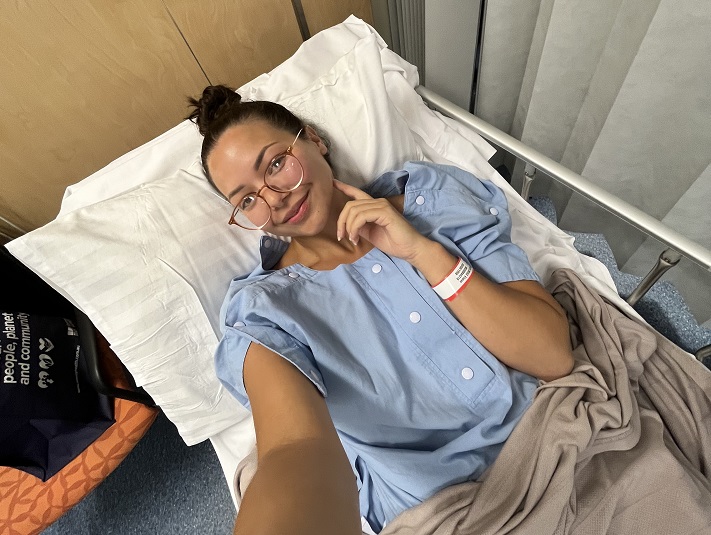“Early intervention is the best intervention” – Eloise’s story

For as long as I can remember, I have had low iron and sluggish bowels but as a female, I was often reassured by GPs, who would say that it’s normal. Thankfully, as a dietitian, I was able to mostly manage those symptoms through diet and exercise but the year before last, my symptoms progressively got worse. I started passing blood in my stool which I knew wasn’t normal but initially passed it off as most likely being hemorrhoids. After all, I was only 24 years old at the time, lived a very healthy lifestyle, and had no family history of anything bowel related — so I wasn’t overly stressed.
When the symptoms persisted, I made an appointment with a new GP as I wanted a new perspective. After some bloods and a stool test (which revealed ongoing low iron, high CRP, and calprotectin), I was referred to a gastroenterologist for a colonoscopy and endoscopy. There I was diagnosed with Crohn’s disease. The whole process took about three months so I was very lucky that it all happened quite quickly. As a result, my disease hasn’t progressed much, if at all.
Unfortunately, I did have an allergic reaction to my first medication, which I’m told is very rare. I ended up with pancreatitis and honestly, that pain was way worse than any Crohn’s symptoms I’d experienced. This narrowed my treatment options so I reached a bit of a sticky point where I was kind of waiting for something to happen to be eligible for new medication. As a healthcare practitioner, I found it quite frustrating that there were no preventative measures or anything that I could do or take in the meantime to prevent my disease from progressing. A year following my diagnosis, my Crohn’s disease had progressed to the point where it thankfully, wasn’t affecting me on a day-to-day basis, but I was eligible for biologics. I actually had my first infusion of Stelara a couple of weeks ago and have tolerated it fine.
My gastroenterologist has been amazing and with friends and colleagues in the healthcare space, I feel comfortable asking any questions, should I need to. I haven’t yet identified any dietary triggers, but I am definitely more aware of what I eat and drink. I think that it’s really important to speak up about IBD and gut health, especially considering bowel habits, is not something many people want to talk about.
In terms of advice for people who are already on their IBD journey, I think the biggest thing would be (as cliche as it is) to know that you are not alone and that there is support out there, should you need it. I’ve been very fortunate with my experience; I was diagnosed quickly and relatively early — I know it’s not always like that. I truly believe that early intervention is the best intervention though so please use this as a reminder to stay on top of your regular health screens. If you do notice any abnormal symptoms, seek guidance from a qualified health professional — no matter how healthy you think you may be.